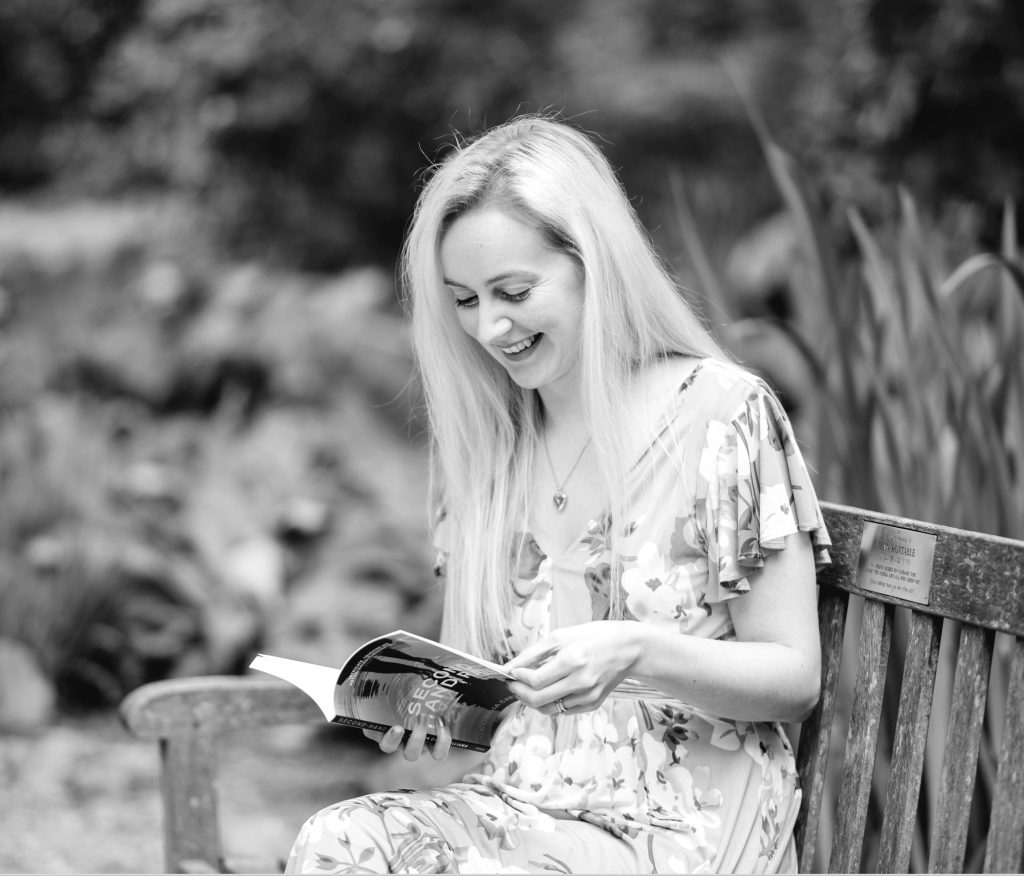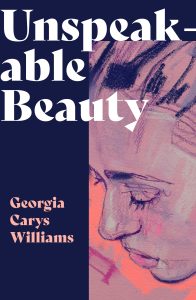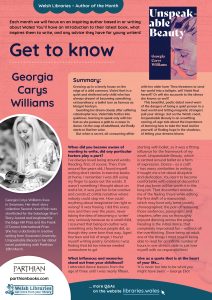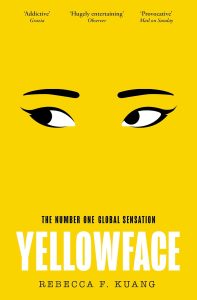Georgia Carys Williams
March 4, 2024
Congratulations Georgia on publishing your debut novel, and thank you for answering a few questions for us.
When did you become aware of wanting to write, did any particular factors play a part?
I’ve always loved being around words. Reading, first, of course. Then, from around five years old, I found myself writing short stories in exercise books at home. I remember I was still using my finger to space out the words. It wasn’t something I thought about an awful a lot, it was just fun to be creative and construct a little narrative where nobody could stop me. How could anything about imagination be right or wrong? It was freeing. I did this every now and then over the years, never taking the idea of becoming a ‘writer’ very seriously because as a small child, I assumed that being an author was something only famous people did, as though they were born that way. Aged fourteen and full of angst, I found myself writing poetry. Emotions I was finding that bit too intense needed somewhere to go!
What influences and memories stand out from your childhood?
I attended dance lessons from the age of three until I was nearly fifteen, starting with ballet, so it was a fitting influence for the framework of my novel, Unspeakable Beauty, which is centred around ballet as a form of expression. Dance – as a craft – has many similarities to writing. It taught me a lot about discipline and dedication. You learn to become comfortable with a kind of discomfort that you know will be worth it in the long run. That discomfort reminds me of the feeling I have while editing the first draft of a manuscript, which may have only been crudely choreographed; the pain of removing those sentences, paragraphs and chapters, after you so thoroughly enjoyed dancing across the pages. Reading is the initial dance, that completely improvised fun – without all the overthinking. Since being an adult, one of the things I most miss is being able to read for an infinite number of hours in one stretch, able to just lose myself with no responsibilities. I genuinely cried when I read the final chapter of the Harry Potter series because I didn’t want to leave Hogwarts for good. It’s sad when you reach the end of a whole world. What then? Well, I suppose by writing, you get to live in another world for a while!
As a young person, who or what influenced you?
I try to be pretty well-rounded, but I probably fitted the same mould a lot of teenage girls did in the mid-2000s. My therapeutic TV included programmes like Dawson’s Creek, One Tree Hill and The O.C., I read Psychologies magazine and read many book genres, but I especially loved coming-of-age books such as Sylvia Plath’s The Bell Jar and J.D. Salinger’s The Catcher in the Rye. When I was a few years younger, I was absolutely addicted to the Cate Tiernan’s Wicca series, and as a small child, I enjoyed reading the Goosebumps collections (R.L. Stine) and books by Roald Dahl.
What are your influences now?
Authors like Margaret Atwood write so skilfully: the way they navigate plots so invisibly behind such beautiful use of language. I think it takes some extra-special talent when literary fiction crosses over into the mainstream. I’m in awe! I love anything new and exciting that I see popping up, especially when they draw the reader into the very psychology of each character. Outside books, every new day, every new walk brings its unpredictable influences, and we don’t always know how they’ll show their face or disguise themselves.
Tell us a little about Unspeakable Beauty, where did the inspiration come from, and what do you hope readers will take from the story…
Unspeakable Beauty is my debut novel, set on the Welsh coast, that warns of the dangers of being a quiet person in a loud world and letting magnetic strangers pull your strings. It is an unsettling coming-of-age tale about the importance of learning how to take the lead and be yourself, of finding hope in the shadows, of letting your dreams bloom.
As someone who was always a quiet and introverted child, years later, I felt the need to explore quietness as a theme in my writing – and the impact it can have on someone’s life. So, creating a quiet and female protagonist who uses dance as a way of expression seemed an ideal way to work with my theme in a delicate and sensitive way. I hope people will find a level of understanding with the protagonist and vouch for her as she encounters the ups and downs of her journey as a vulnerably quiet person. I hope it will be clear, however, that just because someone is vocally quiet, it doesn’t mean their mind isn’t loud, and that everyone has a voice worth listening to.
What are your favourite reading genres, and what books are you reading at the moment?
Coming-of-age is definitely my favourite genre, which is probably why my debut novel falls into the same category. I love witnessing a protagonist’s transformation, their learning curve, something deeply emotional that makes me cry, and I love the story to explore boundaries and how they can so easily become blurred throughout life.
I received an exciting book haul recently and one of the novels was Yellowface by Rebecca F. Kuang. It was purely entertaining, amusing, enlightening and refreshing, attracting a lot of writers to read it, I’m sure. I’m also now finishing Tomorrow and Tomorrow and Tomorrow by Gabrielle Zevin, and it’s been so great to read about a relationship forged through game design and production – I enjoy anything on TV or in books that explores the turbulence of a passion project.
What experiences of libraries have influenced you during your lifetime?
When I think of libraries, I don’t just think of books. I think of a safe and quiet place that someone can visit alone or with others, without being judged. I think of school projects when there was no internet to surf for the information you needed for a history project. They’re one of the few places you can attend for free, without someone asking what your agenda is. What’s great is that different to purchasing a book, you can feel free to choose something completely different to your usual reading choice because there’s no harm in just taking it back. You can be committed to not committing to a book, knowing you have a world of reading opportunity to return to, just sitting on those bookshelves. The freedom in a library’s structure is difficult to find anywhere else. For many years, Swansea University Library was my go-to place for working on creative projects.
What suggestions do you have to encourage children and young people to read more for pleasure?
How often can you really escape the world these days? It’s true that films and TV programmes are readily available via smartphones and other portable devices, but they’re all so overcrowded with different apps and the ping of various communications that it’s become increasingly difficult to truly escape. Think of it like running out into a garden but keeping one foot inside the house, or one ear in a conversation while listening to a song you love. Instead, concentrate on wholly escaping and letting yourself disappear. Since growing up, I’ve realised just how difficult it is to allow yourself to guiltlessly lose yourself in something. Books are one of the few items that still allow us to do that – not only that, they want us to. Hide your face behind a book. Isn’t it fun to become someone else for a while?
Another important point is that not every book suits everyone, but if you look hard enough (and it could take some time) there’ll be a book you find that will feel like it found you! Once you’ve encountered that book, you’ll be hooked and want to find another. Still, don’t be afraid to put a book down if the genre doesn’t fit… We’re all thankfully very different and there will be a whole selection of stories (fiction or non-fiction) that suit you perfectly. Don’t give up if it doesn’t feel like it comes naturally straightaway.
Give us a quote that’s at the heart of your life…
‘It is never too late to be what you might have been.’ – George Eliot.
Unspeakable Beauty will be published 18th March by Parthian.
Read our Get to Know the Author flyer and take a look at our previous Authors of the Month writing in English.




